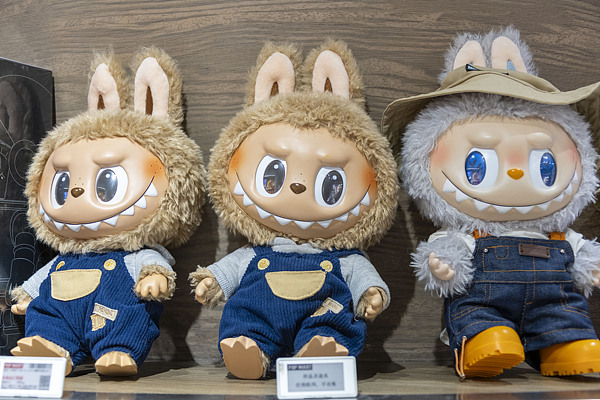The wildly popular character Labubu has taken the world by storm, and that unbelievably lifelike fur comes from a long-established textile firm in Zhangjiagang—Suzhou Longjie Special Fiber Co.

The fur of the wildly popular character Labubu comes from Suzhou Longjie Special Fiber Co, based in Zhangjiagang. [Photo/VCG]
Unlike traditional textile factories, Longjie's smart production facility is fully digitized, integrating automated feeding, high-speed spinning, and intelligent quality control systems. Here, polyester filaments undergo a high-ratio stretching process and microscopic structural modifications, transforming into ultra-realistic, skin-friendly, and eco-conscious faux animal fur fibers.
The technology is the result of over a decade of dedicated research and development (R&D). In 2010, Longjie cracked key technical challenges to launch China's first generation of domestically developed faux animal hair fiber. Since then, the company has continued to innovate, investing over 50 million yuan ($6.98 million) annually in R&D to enhance fiber gloss, loft, and tactile feel. These efforts have secured long-term partnerships with top-tier fabric suppliers to Prada, Gucci, Burberry, and Armani.
Recognizing the surge in demand for designer toys and collectibles, Longjie quickly pivoted to serve this new market. Its advanced faux fur fiber is now a go-to material for plush toys, with strategic collaborations forged with suppliers for Pop Mart, Disney, and other iconic brands.
To date, Longjie holds 70 authorized patents, including 17 for inventions, and has played a leading role in drafting 20 national and industry standards. In 2024, the company posted 1.8 billion yuan in industrial output, up 21 percent year-on-year, and net profits of 57.76 million yuan, a staggering 301 percent increase.
High-end textiles are a signature strength of Zhangjiagang's manufacturing industry. The city is recognized as a "National Textile Industry Base" and home to over 3,100 textile enterprises, including 380 large-scale firms. Zhangjiagang's wool textile sector accounts for over one-sixth of China's total revenue and more than 60 percent of national wool trade volume, underscoring its vital role in both domestic and global supply chains.